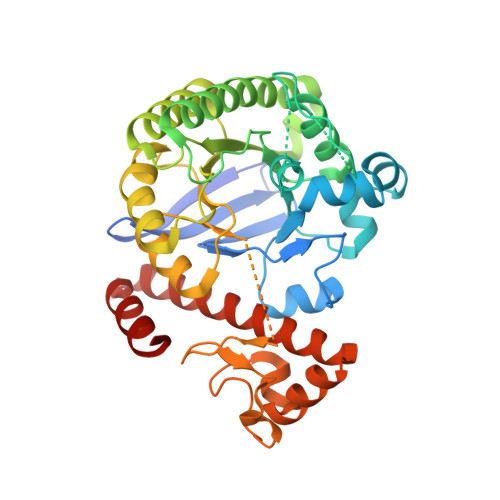Investigation of Specificity Determinants in Bacterial tRNA-Guanine Transglycosylase Reveals Queuine, the Substrate of Its Eucaryotic Counterpart, as Inhibitor
Biela, I., Tidten-Luksch, N., Immekus, F., Glinca, S., Nguyen, T.X., Gerber, H.D., Heine, A., Klebe, G., Reuter, K.(2013) PLoS One 8: e64240-e64240
- PubMed: 23704982
- DOI: https://doi.org/10.1371/journal.pone.0064240
- Primary Citation of Related Structures:
2NQZ, 2NSO, 3BL3, 3BLD, 3BLL, 3BLO, 4E2V, 4GCX, 4GD0, 4H6E, 4H7Z, 4HQV, 4HSH, 4HVX - PubMed Abstract:
Bacterial tRNA-guanine transglycosylase (Tgt) catalyses the exchange of the genetically encoded guanine at the wobble position of tRNAs(His,Tyr,Asp,Asn) by the premodified base preQ1, which is further converted to queuine at the tRNA level. As eucaryotes are not able to synthesise queuine de novo but acquire it through their diet, eucaryotic Tgt directly inserts the hypermodified base into the wobble position of the tRNAs mentioned above. Bacterial Tgt is required for the efficient pathogenicity of Shigella sp, the causative agent of bacillary dysentery and, hence, it constitutes a putative target for the rational design of anti-Shigellosis compounds. Since mammalian Tgt is known to be indirectly essential to the conversion of phenylalanine to tyrosine, it is necessary to create substances which only inhibit bacterial but not eucaryotic Tgt. Therefore, it seems of utmost importance to study selectivity-determining features within both types of proteins. Homology models of Caenorhabditis elegans Tgt and human Tgt suggest that the replacement of Cys158 and Val233 in bacterial Tgt (Zymomonas mobilis Tgt numbering) by valine and accordingly glycine in eucaryotic Tgt largely accounts for the different substrate specificities. In the present study we have created mutated variants of Z. mobilis Tgt in order to investigate the impact of a Cys158Val and a Val233Gly exchange on catalytic activity and substrate specificity. Using enzyme kinetics and X-ray crystallography, we gained evidence that the Cys158Val mutation reduces the affinity to preQ1 while leaving the affinity to guanine unaffected. The Val233Gly exchange leads to an enlarged substrate binding pocket, that is necessary to accommodate queuine in a conformation compatible with the intermediately covalently bound tRNA molecule. Contrary to our expectations, we found that a priori queuine is recognised by the binding pocket of bacterial Tgt without, however, being used as a substrate.
Organizational Affiliation:
Institut für Pharmazeutische Chemie, Philipps-Universität Marburg, Marburg, Germany.

















